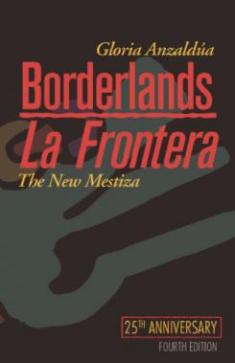Gloria Anzaldua’s Borderlands/ La Fronteras Part 1: Powerful Passages
My book club read Borderlands/ La Frontera: The New Mestiza for the month of October, and since finishing it, my mind continuously returns to multiple passages of this brave collection of writing. I feel my formal education—in all its Women & Gender Studies/ Literature/ Creative Writing- Poetry emphasis glory— neglected me by not introducing me to her work. But, I’m thankful for a continuous informal education that finds such pivotal bodies of writing to study at precious leisure (double clap for Book Clubs!)
While I have much commentary for this heart-wrenching, yet beautiful piece of soul-therapy, I want to honor her words by simply posting some of my favorite quotes. You deserve the right to sit with her words, and transcribe them for yourself.
All quotes are pulled from the fourth edition of Borderlands/La Frontera: The New Mestiza. Unless indicated, any italicize are from the author.
On Language
“So if you want to really hurt me, talk badly about my language. Ethnic identity is twin skin to linguistic identity—I am my language. Until I take pride in my language, I cannot take pride in myself. Until I can accept as legitimate Chicano Texas Spanish, Tex-Mex and all the other languages I speak, I cannot accept the legitimacy of myself. Until I am free to write bilingually and to switch codes without having always to translate, while I still have to speak English or Spanish when I would rather speak Spanglish, and as long as I have to accommodate the English speakers rather than having them accommodate me, my tongue will be illegitimate.
I will no longer be made to feel ashamed of existing. I will have my voice: Indian, Spanish, white. I will have my serpent’s tongue—my woman’s voice, my sexual voice, my poet’s voice. I will overcome the tradition of silence. (81)
On Writing
“The ability of story (prose and poetry) to transform the storyteller and the listener into something or someone else is shamanistic. The writer as shape-changer, is a nahual, a shaman” (88).
“When I write, it feels like I’m carving bone. It feels like I’m creating my own face, my own heart—a Nahuatl concept. My soul makes itself through the creative act” (95).
On Being la Mestiza
“So don’t give me your tenets and your laws. Don’t give me your lukewarm gods. What I want is an accounting with all three cultures—white, Mexican, Indian. I want freedom to carve and chisel my own face, to staunch the bleeding with ashes, to fashion my own gods out of entrails. And if going home is denied me then I will have to stand and claim my space, making a new culture—una cultura mestiza—with my own lumber, my own bricks and mortar and own feminist architecture” (44).
“The new mestiza copes by developing a tolerance for contradictions, a tolerance for ambiguity. She learns to be an Indian in Mexican culture, to be Mexican from an Anglo point of view. She learns to juggle cultures. She has a plural personality, she operates in a pluralistic mode—nothing is thrust out, the good, the bad, and the ugly, nothing rejected, nothing abandoned. Not only does she sustain contradictions, she returns the ambivalence into something else” (101).
“En unas pocas centurias, the future will belong to the mestiza. Because the future depends on the breaking down of paradigms, it depends on the straddling of two or more cultures. By creating a new mythos—that is, a change in the way we perceive reality, the way we see ourselves, and the ways we behave—la mestiza creates a new consciousness” (102).
Stanzas from Poems about the Boarders
“Wind tugging at my sleeve
feet sinking into the sand
I stand at the edge where earth touches ocean
where the two overlap
a gentle coming together
at other times and places a violent crash” (23).
“But the skin of the earth is seamless.
The sea cannot be fenced,
El mar does not stop at borders.
To show the white man what she thought of his
Arrogance,
Yemaya blew that wire fence down” (25)
“To survive the Borderlands
You must live sin fronteras
be a crossroads” (217)
The passage that is rearranging some of my thinking …
“But it is not enough to stand on the opposite river bank, shouting questions, challenging patriarchal, white conventions. A counterstance locks one into a duel of oppressor and oppressed locked in mortal combat, like the cop and the criminal, both are reduced to a common denominator of violence. The counterstance refutes the dominate culture’s views and beliefs, and, for this, it is proudly defiant. All reaction is limited by, and dependent on, what it is reacting against. Because the counterstance stems from a problem with authority—outer as well as inner—it’s a step towards liberation from the cultural domination. But it is not a way of life. At some point, on our way to a new consciousness, we will have to leave the opposite bank, the split between the two mortal combatants somehow healed so that we are on both shores at once and, at once, see through serpent and eagle eyes. Or perhaps we will decide to disengage from the dominant culture, write it off altogether as a lost cause, and cross the border into a wholly new and separate territory. Or we might go another route. The possibilities are numerous once we decide to act and not react” (100-101; italics mine).
